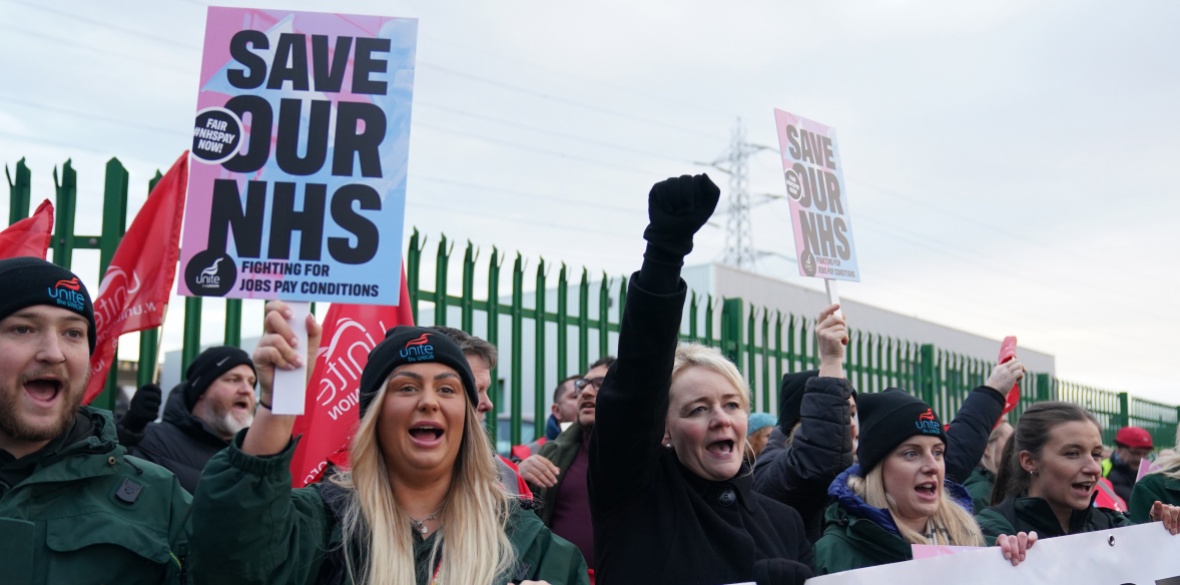This is the last article you can read this month
You can read more article this month
You can read more articles this month
Sorry your limit is up for this month
Reset on:
Please help support the Morning Star by subscribing here
SINCE late in January members of my union, Unite, have been taking industrial action in ambulance trusts as part of the wider NHS dispute — workers, demanding a decent pay rise after more than a decade of real pay cuts.
This is the most recent industrial action in what has been a wave of Unite strike actions — all determined to fight poverty pay and challenge rampant profiteering.
But significantly, this International Women’s Day not only are more trade unions being led by women, including Unite with the election of Sharon Graham as general secretary, but women workers are more prominent in taking industrial action and playing a leading role in organising it.
Clearly the health service unions are playing a major part in that development boosted by the reality that nearly 80 per cent of NHS employees are women — with many convinced that to save the NHS strike action on pay is their only choice.
In the NHS our members are making the choice to strike while the government continues to make choices that make workers pay for the crisis which is not of their making.
For example, tackling rampant profiteering in the energy sector alone could fund a decent pay rise for the NHS, putting money in working women’s pockets along with others that would boost local economies.
Excessive profiteering in the energy sector is forecast to reach £170 billion by the end of 2023. If the correct choices in government were made about taxing that wealth then the so-called fiscal gap could be solved as well as guaranteeing a 10 per cent rise for all NHS workers with millions to spare.
But the government’s policies serve shareholders and big business instead of delivering decent pay for NHS workers, who are predominantly women.
That choice could be the beginning of a Beveridge-style transformation of the current crisis affecting the welfare state. But it is one which will not be made by this government.
The deep cost-of-living crisis delivered by this government’s policies alongside rampant profiteering employers simply further emphasises the necessity of organising collectively together, from the ground up.
And it is women that have the most to gain from this fight, which perhaps offers some explanation as to why women are being increasingly drawn into the industrial strike wave and playing leading roles in it across the movement.
Since August 2021, when Sharon Graham was elected general secretary of Unite, she has led more than 600 disputes for better pay, and won eight out of 10 of them.
Union research estimates this has put more than £300 million of new money into Unite members’ pockets. Sharon has led the union from the front, given her unequivocal backing to workers taking industrial action and transformed the union from gazing endlessly on Westminster as a salvation for workers’ problems to back to what it says on the trade union tin — fighting for jobs, pay and conditions.
Currently in Unite, Sharon is leading summits of reps and members in every region and country of Unite to begin the next phase of organising to win more and better deals across the public and private sectors of the economy.
And where we win Unite’s membership grows also, as workers, especially women workers in greater numbers, are coming to see the real and tangible benefits that trade unionism can deliver in their lives and local communities.
The labour movement, as a whole, still has much to do to reach into sectors and workplaces which still have a low density of union members — and these tend to be sectors where women workers are present in greater numbers and, along with black and Asian workers, are often actually the majority.
So on this International Women’s Day, while we can recognise that in the UK women workers are playing a predominant role in the current wave of industrial action, we also need to recognise the need for building the movement by penetrating those sections of the economy where women workers are still not actively unionised.
An example from Unite in this drive is that we are now taking action to drive through equality in the workplace as a core industrial demand affecting all our women members — the days of equality being an add-on in negotiations with the employers in negotiations are over.
As well as taking action to win better — and equal — pay, Unite is running campaigns such as our “Get me home safely campaign” in hospitality — where low pay, zero-hours contracts and changing shift patterns can leave women workers in particular left unable to plan a safe way home, waiting at dark bus stops or walking home alone.
Also our “Uniting for a Workers’ Economy” organising in communities is supporting campaigns such as the STUC Women’s demand for Free School Meals.
In these days we need to recall that it was women in struggle in the “matchmakers” strike that was one of the great inspirations of the time which were so essential in the eventual rise of the modern industrial labour movement.
This current wave of action, with women’s role so significant, is a breakthrough that has been a long time coming. Now, more than ever, we can say without question that a woman’s place is in her union.









